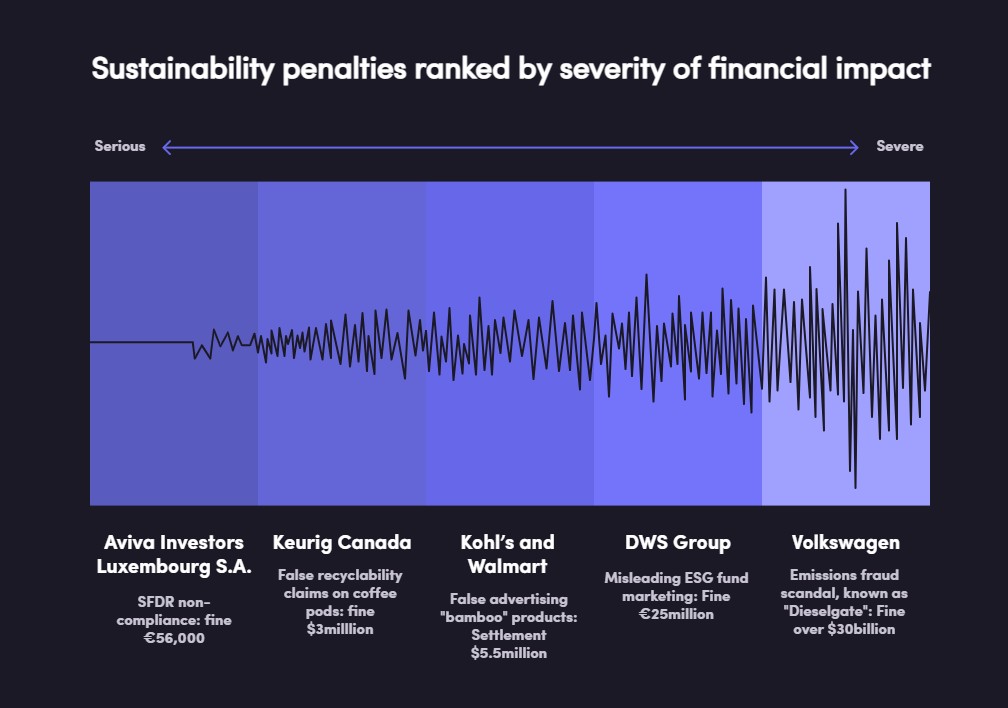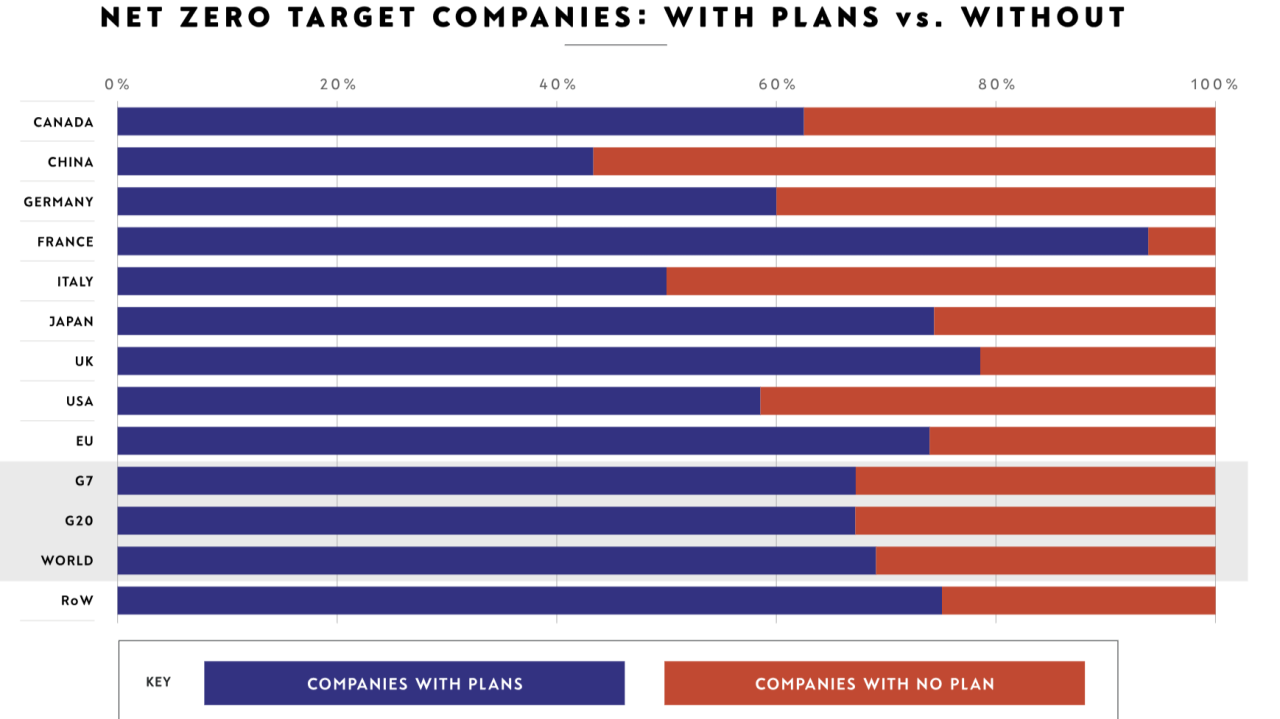
From mandate to momentum: Regulation as a force for positive change

Maria Coronado Robles
How workforce learning in sustainability regulation can power strategic transformation

In April 2025, the Frankfurt Public Prosecutor’s Office issued a fine of €25m against DWS Group (formerly Deutsche Asset Management). It was one of Europe’s largest greenwashing penalties to date. The offence? Greenwashing.
The fine followed a multi-year investigation into sustainability claims DWS made between 2020 and 2023. Over that period, the company marketed financial products with ESG credentials that simply weren’t there yet. Marketing got ahead of reality, presenting works in progress as if they were finished achievements. It didn’t matter that the business was in the middle of a sustainability “transformation process”. Marketing needs to be specific to work completed, not what was in process or envisaged. The lesson? You can’t sell intent as achievement.
It matters because this isn’t just about one company. Many players across industry sectors have faced fines, bans, and sanctions for misleading claims or insufficient disclosures (see the figure below for just a few examples). And financial penalties are just a few of the consequences.
The real impact goes beyond money; companies face severe legal, operational, and reputational risks that are material, and playing out publicly on a global stage. Stories like DWS’s have made headlines worldwide, showing that sustainability missteps can lead to legal scrutiny, loss of investor and customer trust, and operational disruptions.
Regulators are escalating enforcement. Consumer trust is fragile. Investor scrutiny is intensifying. And litigation risk is growing, especially around greenwashing and inaccurate or incomplete disclosures. In a regulatory landscape that is complex and changing fast, where is the opportunity? How do businesses move forward and create value instead of just ticking boxes?
In this insight, we explore:
- Key sustainability regulations reshaping company expectations and risk
- How to meet goals and create value through workforce upskilling that aligns and leverages cross-functional capabilities.
- Ways in which businesses are turning compliance into competitive advantage

A seismic shift in the regulatory landscape
Companies have been talking about sustainability for ages, some more seriously than others. Either way, it was mostly on their terms, choosing what to measure, what to share, and what to keep quiet. That era is over now.
The EU’s comprehensive and interconnected suite of sustainability regulations — for example, the Corporate Sustainability Reporting Directive (CSRD), Sustainable Finance Disclosure Regulation (SFDR), and the Greenwashing Directive — are more than an incremental update to existing rules. They reflect a systemic rethink of the relationship between business, society, and the environment. Together, these regulations form part of the EU’s broader strategy to drive sustainability into the heart of economic life, anchored in the European Green Deal and the transition to net-zero by 2050.
In particular, the CSRD initiated a seismic shift starting in 2025, requiring detailed sustainability reporting. More is set to follow in stages through 2028. The Omnibus package, introduced in early 2025, proposes easing timelines and narrowing the scope, especially for smaller companies. As of mid-2025, negotiations are still ongoing with potential changes still up in the air.
But this won’t change one of the fundamental principles: the CSRD’s introduction of the concept of “double materiality,” a dual lens that requires businesses to report on both:
- How sustainability risks and opportunities affect financial performance (outside-in)
- How the business’s operations impact society and the environment (inside-out)
This isn’t a minor technical tweak. It’s a strategic reframing that compels companies to see sustainability not as a peripheral PR issue, but as a core component of risk, performance, and value creation.
These frameworks reshape the expectations placed on companies. They require transparency, traceability, and action. And they signal a fundamental truth: sustainability performance is no longer a soft issue. It’s a board-level, firm-wide, investor-critical matter.
How can companies respond to this fast-moving regulatory environment? A vitally important, actionable solution is to upskill and equip your workforce. Every team needs to understand the rules, adapt quickly, and deliver credible, consistent reporting. Because when knowledge is fragmented or incomplete, the risks aren’t just technical, they are legal, operational, and reputational. And they carry real consequences.
Compliance is not a department — it’s a culture
You can’t meet today’s sustainability rules with yesterday’s mindset. The breadth and interconnectedness of these regulations demand a fundamentally different approach to compliance. This isn’t about drafting one-off reports or parking responsibility in a small, overstretched sustainability team. The scale of the task, and how fast it’s evolving, demands something deeper, a culture shift.
It’s about embedding sustainability awareness, literacy, and capability across the entire organisation. Sustainability needs to live across the business, in strategy, operations, reporting and people’s day-to-day decisions.
This is a big task and many organisations are already feeling the strain:
- Sustainability teams are under-resourced and overextended
- Business units do not understand their role in compliance
- Some executives still see sustainability as a distraction from “real work”
- Data is fragmented, inconsistent, or simply unavailable
What’s needed now is a whole-business approach to sustainability. One that connects the dots between strategy, operations, risk, reporting, and, crucially, people. Because it’s not frameworks that bring sustainability strategies to life; it’s your workforce.
It’s about moving from fragmented, reactive compliance efforts to integrated, proactive capability-building across the enterprise.
From regulation to real advantage
For some companies, regulation feels like pressure, a box to tick or a burden to manage. For others, it is both a catalyst to outperform over the long term, and a reality check about the kind of business they are building. When sustainability becomes a legal requirement, you can’t outsource it to a side team, you have to integrate it into decisions, how you design products, run operations, manage risk, open new markets and engage people.
It’s about building a business that can respond to disruption without defaulting to crisis mode. One that sees risk early, acts before it’s forced to, and earns trust by making choices that deliver value now, and hold up under scrutiny later. Because this is what turns regulation from a mandate into a competitive advantage.
Beyond cutting waste or reducing costs, regulations can push companies to reimagine products, services, and business models. This innovation mindset helps companies develop new offerings aligned with climate and social goals, tapping into emerging consumer preferences, and even redefining entire markets. It builds trust with stakeholders, including investors, customers, employees and regulators. It attracts the next generation of talent and aligns business with the values of society.
And importantly, it signals resilience: the ability to navigate disruption, anticipate risks, and respond with confidence.
Our work with clients, as well as industry research, supports this theory:
- Unilever saved over $1 billion through its sustainability strategy, demonstrating that the right approach can materially reduce operating costs.
- HSBC drastically reduced energy consumption, saving over $100m in costs, through a global operations makeover, explored in a recent bespoke video for Sustainability Unlocked.
- Firms with strong sustainability profiles enjoy better access to capital and more favourable loan terms.
- Consumer behaviour is shifting: over 80% of global consumers are willing to pay more for products aligned with their values.
In a world where environmental concerns are shaping markets, sustainability integration is a strategic growth engine.

How can businesses leverage sustainability to create value? What it takes to deliver
We’re moving into a new phase where capability matters more than commitments. Now the question isn't "Do we have a plan?" but "Do we have people who can actually deliver it?”. And that doesn’t happen by accident. It requires deliberate investment in systems, governance, and, most critically, people:
1. Building board and executive-level capabilities
Leaders must understand the regulatory landscape and the business case for sustainability, so they can guide strategy, allocate resources, and model accountability. If boards don’t understand how regulation intersects with risk, innovation, capital, and market access, they will slow the organisation down. And if they’re waiting for someone else to tell them what to do, they’re already behind.
2. Embedding sustainability Into risk and compliance frameworks
This isn’t about adding a new column to an old spreadsheet, it means running scenarios, testing assumptions, auditing supply chains, doing materiality assessments, and aligning with standards like the Global Reporting Initiative (GRI), the Taskforce on Climate-related Financial Disclosures (TCFD), and the International Sustainability Standards Board (ISSB).
Risk and compliance are not support functions, organisations that do this well are not just more compliant; they are challenging assumptions to find out where the business is most vulnerable. The real question is no longer “Did we report this?”, it is “Did we see it coming?”.
3. Developing sustainability fluency across functions
Legal, finance, ops, comms, procurement, everyone touches sustainability now. But role-specific knowledge is missing in too many places and without it, the strategy never lands, projects slow down, risk gets missed and goals don’t get met. People need to stop thinking of sustainability as someone else’s job, and start seeing where it already intersects with their own. Finance needs to know how sustainability changes reporting structures, legal needs to know how it changes liability, and procurement needs to know how it changes sourcing risk.
4. Creating scalable learning pathways
Capability isn’t a nice-to-have, it is a credibility filter. But using one-off training as that filter is like trying to catch a waterfall with a sieve, it’s too limited to capture complex flows like sustainability regulations and risks. What’s needed now is continuous, evolving training, led by people who understand the regulations, the risks, and the realities on the ground. And it has to be built into the rhythm of how people actually work. That’s where platforms like Sustainability Unlocked deliver the most impact.
Sustainability learning as a strategic lever
You can’t navigate evolving and increasingly complex sustainability rules with surface level understanding. That’s not how you build real capability, resilience, or trust. You build it when a finance lead flags a sustainability risk before the auditors do; when the procurement team rewrites a purchasing brief because they identified a supply chain disruption risk before it affected delivery timelines or product quality; or when a comms person says, “we’re not ready to say anything, it would sound as if it's greenwashing”.
What matters is whether people at every level get what’s coming, know what to do about it, and have the confidence to speak and act under pressure. Regulations keep shifting? Good, your learning should too.
At Sustainability Unlocked we build capacity, and that means role-specific, expert-led learning designed for the real decisions people have to make in their role, whether that’s in finance, legal, procurement, operations, or the boardroom.
Our platform is co-created and delivered by the world’s best experts, bringing together cutting-edge regulatory insight, practical tools, and sector-specific applications. Our content evolves with regulation, shaped by the practitioners who work on the front lines, the ones who know what matters, what’s changing, and how it all connects.
We are regularly publishing new regulatory content to ensure businesses have access to the latest guidance, delivered by the expert practitioners who know first hand how to translate principles into practice. Here are a few of our newest expert-led videos:
- Introduction to the ESRS, Laura Houët, Co-Head of ESG at CMS
- Practitioner's Guide to to CSRD and ESRS, Michelle Horsfield, Executive Director, ESG Advisory, Sumitomo Mitsui Banking Corporation
- Linking SFDR, CSRD, and the EU Taxonomy, Arun Kelshiker, Head of EMEA Sustainable and Impact Investing, Invesco
- EU Greenwashing Directives I and II, Keith Mullin, Founder, KM Capital Markets
They’re part of a continuous learning partnership, built to help organisations move from compliance to confidence, and from reacting to leading.
The way forwards: Agility over anxiety
Companies are being pushed to act now, even though the ground keeps shifting beneath them. That is where the risk lies, reputational, operational and legal. Key areas like Scope 3 emissions, double materiality, and SME obligations are still in flux, with active debate and regulatory refinements ongoing. Yet, businesses must make decisions and show progress even before the final requirements are nailed down. This brings uncertainty and raises the stakes. Move too fast and you risk missteps; move too slow and you risk falling behind or losing trust.
Handling this means building the muscle to adapt quickly, anticipate changes, and make sound calls even when the map isn’t fully drawn. It’s not just about compliance, it’s about staying resilient, credible, and ready to succeed in a landscape that keeps evolving.
Navigating this demands building capability that isn’t centralised in one team but distributed across the organisation. It lives in everyday decisions, in procurement, in legal, in finance, on the front line. So maybe the question isn’t: “Have we trained our teams?”, it is “Can our people spot risk and opportunity early, and act on it?”.
The future belongs to those who embrace this shift in mindset, not reluctantly, but strategically.
If you’re ready to make sustainability a superpower for your organisation, Sustainability Unlocked is here to help. Sustainability Unlocked empowers your workforce with the knowledge and capabilities to navigate regulatory change, deliver on sustainability commitments, and create lasting impact.
Contact our team today to explore how we can help your business master the regulatory landscape, and turn compliance into competitive advantage.

Maria Coronado Robles
Share "From mandate to momentum: Regulation as a force for positive change" on
Latest Insights

Lights in the fog: Positive signals for sustainability investment
2nd October 2025 • Henry White
































